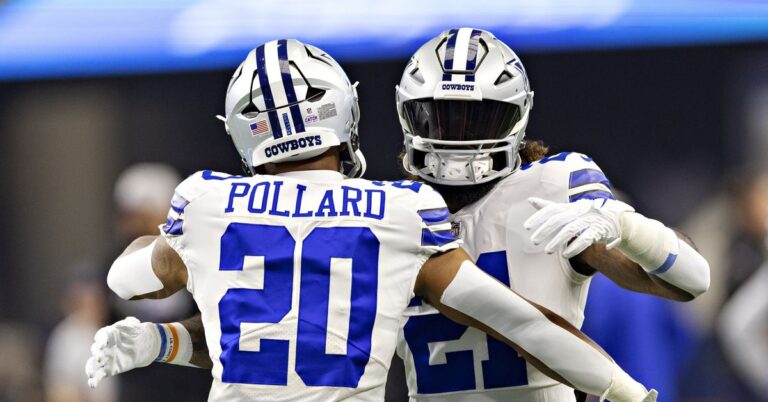For the second straight game, Ezekiel Elliott remained on the sidelines as he deals with a knee injury. That meant Tony Pollard served as the top running back for the Cowboys and he responded with a career high 22 carries, which he took for 115 yards and a touchdown.
This is notable because the Cowboys have set themselves up with a series of decisions to make at the running back position in the offseason, Pollard’s rookie contract expires after this year, so they’ll have to decide whether or not to extend the explosive runner.
Ezekiel Elliott’s contract gives the Cowboys have a potential out this offseason that could save them just under $11 million in cap space. Otherwise, Elliott will have a cap hit of $16.72 million next year, and it would be very financially difficult to move on from him until his current contract expires after the 2026 season. In essence, the Cowboys can either cut him this offseason and save tons of money, or commit to him for the next four years.
Based on how much Jerry Jones has rushed to Elliott’s defense after each of these last two games – usually in response to Pollard playing so well that many question why Elliott makes as much as he does – it will be interesting to see the decision made there. It’s unlikely that the Cowboys would be able to pay Pollard what he wants (and deserves) while keeping Elliott.
Here’s an interesting alternative to consider, though: how about neither?
Both Elliott and Pollard have provided tremendous value to the Cowboys over the length of their respective careers, but at the end of the day it really boils down to an argument of positional value. The running back position has been significantly devalued in recent years as teams have found proven ways of creating efficient rushing attacks without splurging on the running back position.
The Cowboys, ironically, have proved this theory themselves too. Several times, actually. They took a lot of heat for not re-signing DeMarco Murray after the 2014 season, but cheap free agent signee Darren McFadden came in and rushed for over 1,000 yards and helped Dallas rank 10th in rushing DVOA that year. Then there’s Pollard, who was taken in the fourth round, and has outperformed Elliott in a variety of ways since arriving in Dallas.
Now there’s yet another chapter in this Running Backs Don’t Matter manifesto, and his name is Malik Davis. Signing with the Cowboys as an undrafted free agent, Davis wasn’t even good enough to make the roster. He was cut at the conclusion of the preseason, and 31 other teams passed on him on the waiver wire, allowing the Cowboys to add him to their practice squad.
Davis got called up to the roster when Rico Dowdle landed on the injured reserve, but he played exclusively on special teams. That is, until Elliott started missing games. In these last two games, Davis has spelled Pollard, who just isn’t used to being the lead back regardless of whether he can handle the load.
It’s been a small sample size for Davis, but he’s shown plenty of flash. Davis has 13 carries for 61 yards – a crisp 4.7 yards per carry – and has added 18 yards on two receptions. He came incredibly close to scoring a touchdown on one of those catches, too. Out of Davis’ 15 touches, four of them have moved the chains.
None of this is enough to make us forget about all the talent Elliott or Pollard have, but it fuels the underlying idea that you can find average-level talent, if not better, at the running back position without having to invest premium draft capital or money. The rushing duo of Pollard and Davis has been electric these last two games; neither were drafted on the first two days of the draft, and neither is even in the top 75 of running back salaries.
So why should the Cowboys stick with Elliott, whose total contract value still leads the league at his position? Furthermore, why should they pay Pollard what is likely to be a fairly large sum of money? Instead of paying either running back big dollars, they could walk into free agency with an extra $12 million in cap space that can be used to find a starter at a more important position, like receiver or offensive line.
The Cowboys may keep paying Elliott loads and loads of money, but they’ve accidentally proven time and again that they don’t need to. And admitting as much also means they shouldn’t turn around and do the same with Pollard. For how much this front office loves to talk about cap space, they’re certainly not being smart with how they manage that money.


